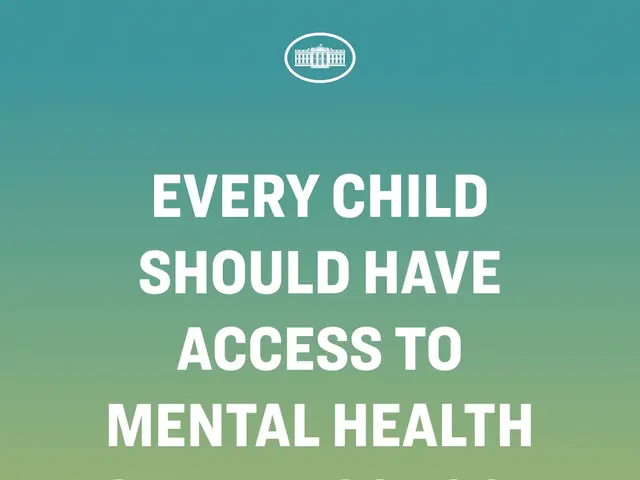Strategies to Quell Worrying and Eliminate Anxious Mental Chatter
Take Control of Your Worry Habit: A Guide to Managing Chronic Anxiety
Living with constant worry and anxiety isn't a walk in the park. But don't worry, this guide will provide you with practical tips to help manage your worries and live a more balanced, stress-free life.
How do you know if you worry too much?
Chronic worry can manifest itself in various ways, including restlessness, fatigue, sleeplessness, muscle tension, self-medication, and changes in social life. If these symptoms sound familiar, it might be time to take action.
Why do we worry so much?
Negative and positive beliefs about worrying fuel anxiety. Negative beliefs, such as worrying is harmful or you'll lose control, and positive beliefs, like worrying helps you avoid bad things, contribute to the worry cycle.
Break the worry habit
Chronic worrying is a mental habit, but it can be broken. Here are some effective strategies to help you take control of your worrying:
Create a daily "worry" period
Postponing worried thoughts is effective because it helps break the habit of dwelling on worries when you have other things to do. During your worry period, write down your worries, then deal with them during that set time.
Challenge anxious thoughts
Challenging your negative thinking patterns during your worry period can help develop a more balanced perspective. Identify and dispute cognitive distortions, such as overgeneralization, all-or-nothing thinking, and emotional reasoning, to gain more control over your anxious thoughts.
Identify what's within your control
Productive, solvable worries are those you can take action on right away. Unproductive, uncontrollable worries are those for which there is no corresponding action. Learn to let go of the uncontrollable worries and focus on the things you have the power to change.
Practice mindfulness
Mindfulness techniques help you focus on the present and interrupt the endless loop of negative thoughts and worries. Try deep breathing exercises, progressive muscle relaxation, or meditation to regain control over your thoughts.
Connect with others
Talking about your worries face-to-face with a trusted friend, family member, or therapist can help calm your nervous system and provide valuable perspective on your problems. Building a strong support system is crucial to overcoming chronic anxiety.
Healthy Lifestyle Changes
In addition to the tips mentioned above, maintaining a healthy lifestyle can also help reduce anxiety symptoms. Adopt a balanced diet, ensure adequate sleep, exercise regularly, and limit stimulants like caffeine and sugar, as these changes can significantly improve your overall well-being.
Remember, breaking the worry habit takes time and patience. Implementing these strategies may provide small signs of success, such as less tension in your body or escaping long cycles of rumination, paving the way to a more present and less anxious life.
Support Resources
- NAMI Helpline (U.S.): 1-800-950-6264
- Find a Therapist (U.S.): Anxiety Disorders Association of America
- Anxiety UK (UK): 03444 775 774
- Anxiety Canada: Provincial Helplines
- SANE Help Centre (Australia): 1800 18 7263
- Helpline (India): 1800 2333 330
[1] Behavioral Tech LLC. (n.d.). What is ACT?: Acceptance and Commitment Therapy. https://contextualscience.org/what-is-act[2] Martin, A., & White, J. (2016). Anxiety disorders explained. John Wiley & Sons.[3] Huda, M. F., & Lorenzett, M., Young, A. (2019). A systematic review of Hatha Yoga for depression. Complementary Therapies in Clinical Practice, 32, 126-134.[4] Dialtone. (2018). Why Deep Breathing Helps Anxiety: Understanding the Diaphragm. https://www.dialtone.today/blog/deep-breathing-helps-anxiety-understanding-diaphragm[5] McGonagle, A. (2020). 12 Natural anxiety relief tips that work. HelpGuide.org. https://www.helpguide.org/articles/anxiety/natural-remedies-for-anxiety.htm
- Emotional intelligence and science can work together to identify the causes of anxiety, which may help in developing more effective strategies for anxiety relief in the field of health-and-wellness, while mental health professionals can utilize evidence-based techniques like acceptance and commitment therapy, cognitive behavioral therapy, Hatha Yoga, deep breathing exercises, and mindfulness to provide anxiety relief for their clients.
- Adopting a healthy lifestyle, such as maintaining a balanced diet, ensuring adequate sleep, exercising regularly, and limiting stimulants like caffeine and sugar can improve overall well-being and act as a preventive measure for anxiety while also supporting the effectiveness of emotional intelligence and science in providing anxiety relief strategies, contributing to a more stress-free life.







